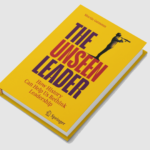When Failure Fuels Breakthrough: What Science Reveals About Leadership Success

“The most powerful leadership truth is that failure almost always precedes success, yet the most powerful leadership irony is that success is often the first step to failure.” — John Mattone, Law #9, The 50 Laws of Intelligent Leadership
In the world of leadership development, failure is often romanticized as a necessary stepping stone to growth. But what if there were scientific evidence backing this up? And what if this evidence didn’t just apply to leaders but to scientists, founders, and decision-makers across fields?
Why We Need to Take Failure Seriously
Enter Professor Dashun Wang of Northwestern University, who has spent years quantifying the rhythms of failure and success. In a landmark study published in Nature Communications (2019), Wang and his colleagues examined nearly 800,000 grant applications submitted to the U.S. National Institutes of Health (NIH). Their key discovery? Early-career scientists who narrowly missed receiving funding went on to outperform their near-winning peers in long-term impact—but only if they persevered.
The pattern held true in a broader sense as well. In a subsequent study published in Nature (2019), Wang explored how people across science, entrepreneurship, and security fields learn from failure. The results revealed a clear distinction: success tends to follow those who systematically refine their approach after each setback. In contrast, individuals who fail to adapt often remain stuck, repeating unproductive behaviors.
Feedback as a Leadership Lever
One crucial factor that emerged from Wang’s research is the role of feedback. Resilient individuals not only persist but seek out and integrate feedback loops into their learning cycles. This feedback can come in many forms: formal evaluations, peer review, market reactions, or reflective self-assessment. What matters is not just the presence of feedback, but how one acts upon it. The most successful individuals treat feedback not as judgment but as raw material for growth.
Mattone’s Leadership Law Meets Wang’s Research
John Mattone’s Law #9 captures this paradox with elegance and force: “Failure almost always precedes success” — a truth that Wang’s research makes visible through data. Yet, as Mattone warns, “success is often the first step to failure.” This irony is reflected in Wang’s work, too. For instance, early success without critical learning may set a fragile foundation. Those who succeed too easily may miss the deeper introspection and strategic refinement that failure tends to provoke.
What The Science of Science Adds
These insights are elaborated further in Wang’s co-authored book The Science of Science, which distills a decade of empirical research into the factors that shape scientific careers. The book explores themes such as productivity patterns, the impact of collaboration, the role of mentorship, the diffusion of ideas, and the dynamics of innovation. A central theme is the predictability of career trajectories—not in a deterministic sense, but in patterns that can be observed, modeled, and understood. This has powerful implications for leadership.
Why This Matters for Today’s Leaders
For leaders navigating complexity, Wang’s findings support a central pillar of intelligent leadership: resilience is not just about bouncing back. It’s about learning forward. It’s about using every experience, success or failure, as data to sharpen one’s judgment and renew one’s purpose.
The best leaders are not defined by uninterrupted upward trajectories, but by their ability to metabolize setbacks into sharper strategies and stronger character. In this way, failure doesn’t merely precede success; it transforms it.
Sources:
- Mattone, J. (n.d.). The 50 Laws of Intelligent Leadership.
- Wang, Y., Jones, B.F. & Wang, D. Early-career setback and future career impact. Nat Commun 10, 4331 (2019).
- Wang, D., & Barabási, A. (2021). The Science of Science. Cambridge: Cambridge University Press.
- Yin, Y., Wang, Y., Evans, J.A. et al. Quantifying the dynamics of failure across science, startups and security. Nature 575, 190–194 (2019)

Explore the leadership and executive coaching services I offer
Discover how my executive coaching can help you reconnect with purpose and achieve sustained success. Explore the services I offer and feel free to reach out to discuss the approach that best aligns with your leadership goals.











